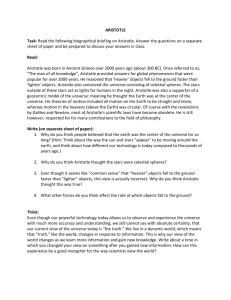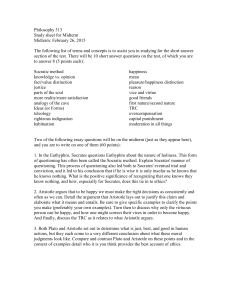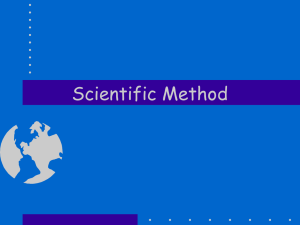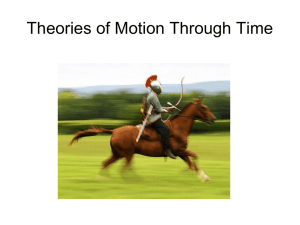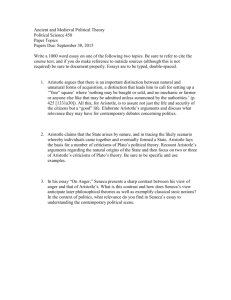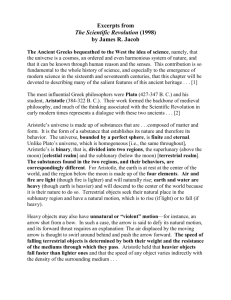Q1 with answers on next page
advertisement
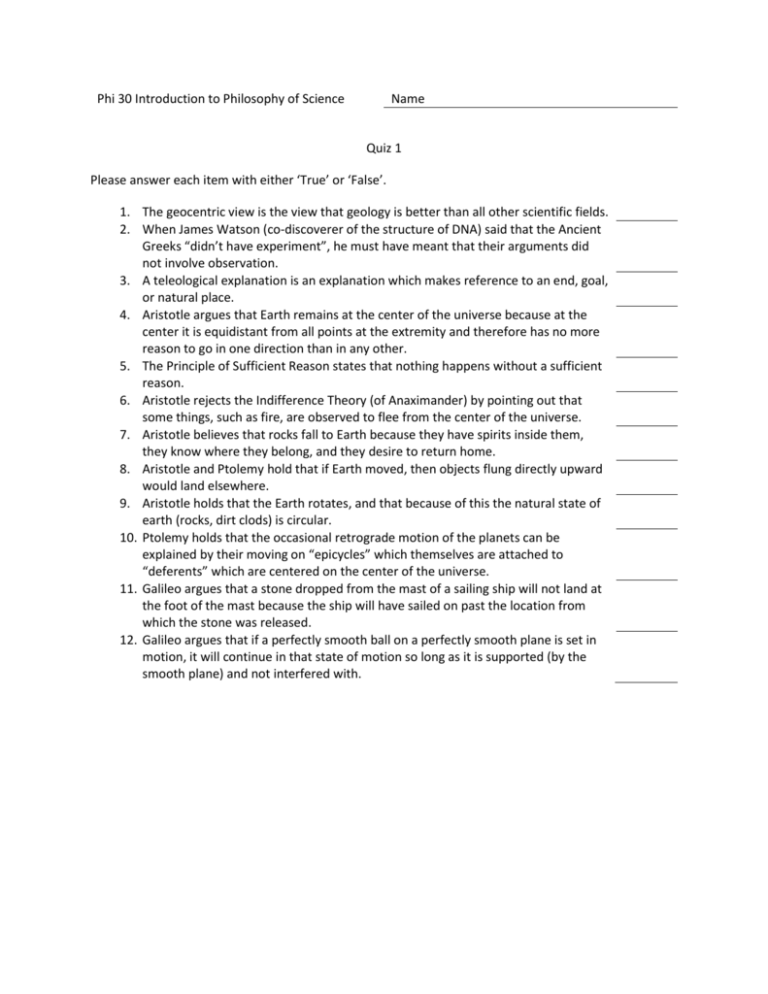
Phi 30 Introduction to Philosophy of Science Name Quiz 1 Please answer each item with either ‘True’ or ‘False’. 1. The geocentric view is the view that geology is better than all other scientific fields. 2. When James Watson (co-discoverer of the structure of DNA) said that the Ancient Greeks “didn’t have experiment”, he must have meant that their arguments did not involve observation. 3. A teleological explanation is an explanation which makes reference to an end, goal, or natural place. 4. Aristotle argues that Earth remains at the center of the universe because at the center it is equidistant from all points at the extremity and therefore has no more reason to go in one direction than in any other. 5. The Principle of Sufficient Reason states that nothing happens without a sufficient reason. 6. Aristotle rejects the Indifference Theory (of Anaximander) by pointing out that some things, such as fire, are observed to flee from the center of the universe. 7. Aristotle believes that rocks fall to Earth because they have spirits inside them, they know where they belong, and they desire to return home. 8. Aristotle and Ptolemy hold that if Earth moved, then objects flung directly upward would land elsewhere. 9. Aristotle holds that the Earth rotates, and that because of this the natural state of earth (rocks, dirt clods) is circular. 10. Ptolemy holds that the occasional retrograde motion of the planets can be explained by their moving on “epicycles” which themselves are attached to “deferents” which are centered on the center of the universe. 11. Galileo argues that a stone dropped from the mast of a sailing ship will not land at the foot of the mast because the ship will have sailed on past the location from which the stone was released. 12. Galileo argues that if a perfectly smooth ball on a perfectly smooth plane is set in motion, it will continue in that state of motion so long as it is supported (by the smooth plane) and not interfered with. 1. The geocentric view is the view that geology is better than all other scientific fields. 2. When James Watson (co-discoverer of the structure of DNA) said that the Ancient Greeks “didn’t have experiment”, he must have meant that their arguments did not involve observation. 3. A teleological explanation is an explanation which makes reference to an end, goal, or natural place. 4. Aristotle argues that Earth remains at the center of the universe because at the center it is equidistant from all points at the extremity and therefore has no more reason to go in one direction than in any other. 5. The Principle of Sufficient Reason states that nothing happens without a sufficient reason. 6. Aristotle rejects the Indifference Theory (of Anaximander) by pointing out that some things, such as fire, are observed to flee from the center of the universe. 7. Aristotle believes that rocks fall to Earth because they have spirits inside them, they know where they belong, and they desire to return home. 8. Aristotle and Ptolemy hold that if Earth moved, then objects flung directly upward would land elsewhere. 9. Aristotle holds that the Earth rotates, and that because of this the natural state of earth (rocks, dirt clods) is circular. 10. Ptolemy holds that the occasional retrograde motion of the planets can be explained by their moving on “epicycles” which themselves are attached to “deferents” which are centered on the center of the universe. 11. Galileo argues that a stone dropped from the mast of a sailing ship will not land at the foot of the mast because the ship will have sailed on past the location from which the stone was released. 12. Galileo argues that if a perfectly smooth ball on a perfectly smooth plane is set in motion, it will continue in that state of motion so long as it is supported (by the smooth plane) and not interfered with. False False True False True True False True False True False True
